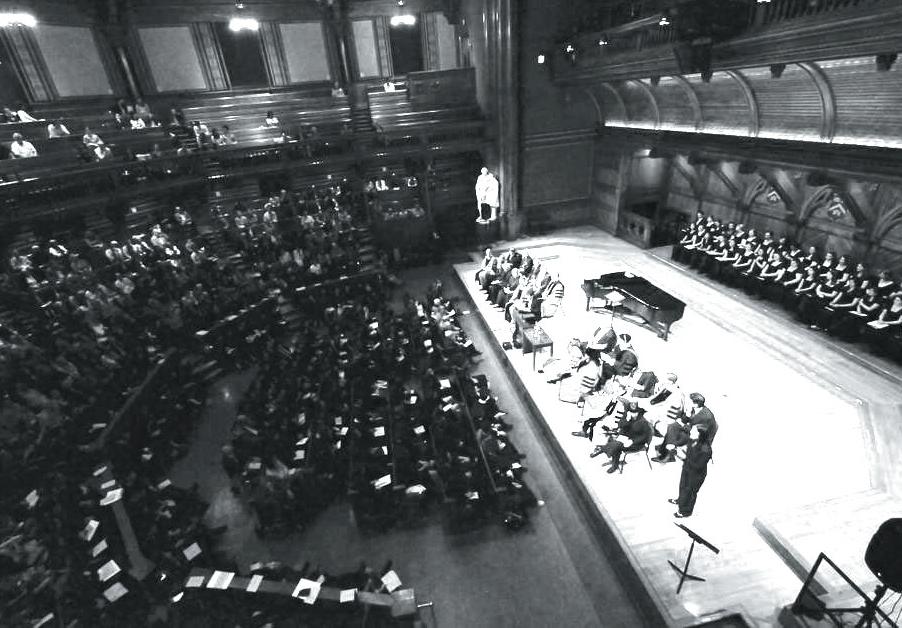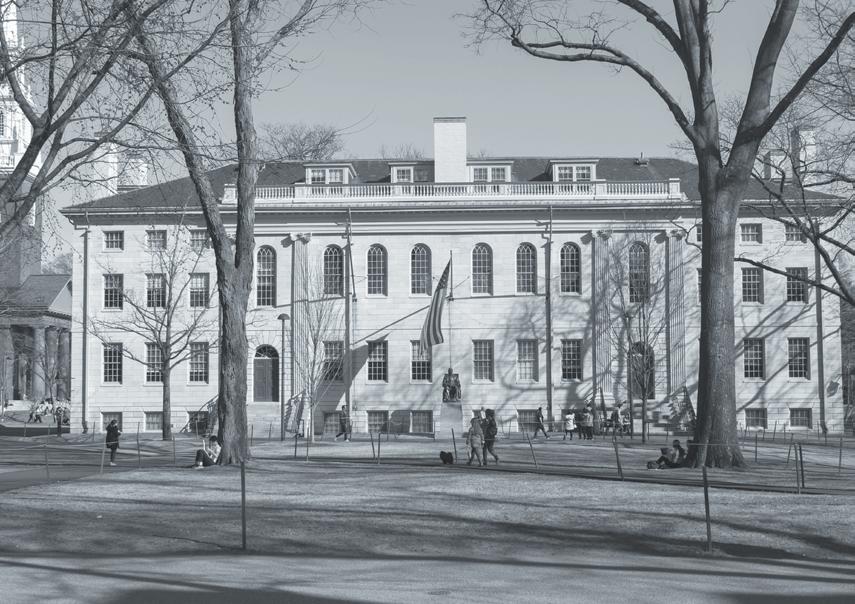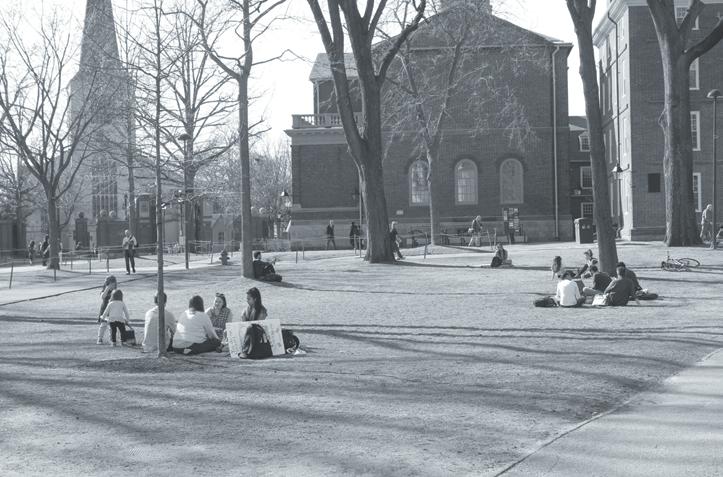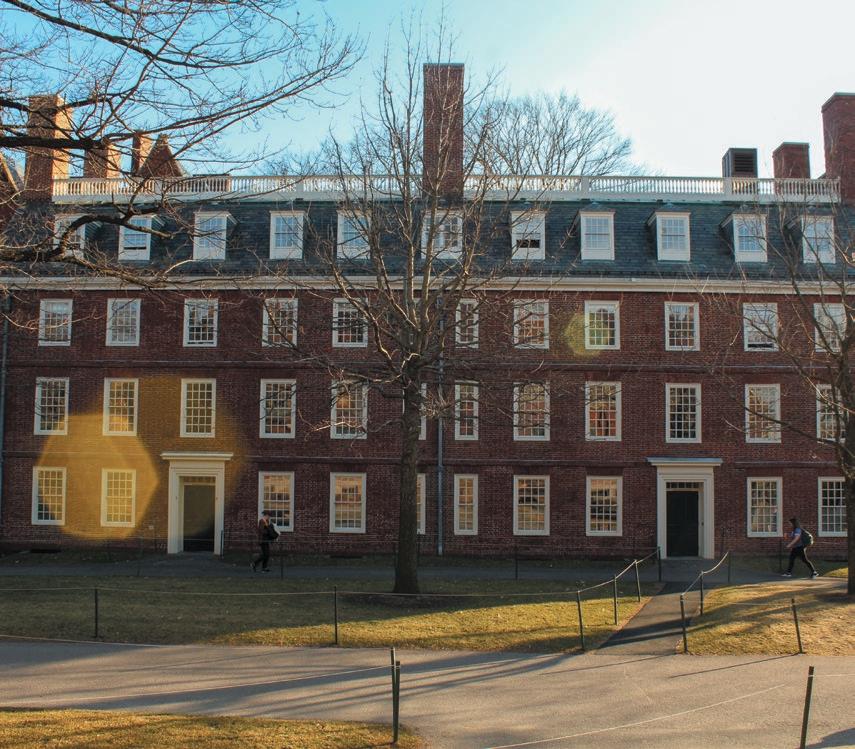Page 3
THE HARVARD CRIMSON | March 10, 2020
housing From Page 1
COVID-19 Blocks Housing Day “At this time, HUHS is not providing testing, independent of these agencies.” Burke also announced that, effective immediately, “non-Harvard affiliated out-oftown guests” are barred from staying on campus overnight. Kirkland House Committee CoChair Maranda Ngue ’22 said in an interview Monday though she was “suspecting” a postponement, she is still “disappointed” by the announcement. She also said the house committee is “brainstorming” alternative ways to welcome freshmen to the House. “The way that we planned for our HoCo in Kirkland was we would continue on with our plan, thinking that maybe Housing Day would happen, so either way we were ready to go,” Ngue said. “It’s kind of unfortunate, but we’re trying to find a way to make sure that the next incoming class of Kirklanders are very welcome here.” The email comes on the heels of the College’s decision to cancel Visitas — Harvard’s annual admitted student weekend — over similar fears of the outbreak. Dean of Admissions and Financial Aid William R. Fitzsimmons ’67 informed admitted students in a Friday email the College will
replace the event with “Virtual Visitas,” a program of videos and online events. The University is also discouraging all non-essential international travel for spring break and strictly barred all University travel to countries with a Level 3 Travel Warning from the CDC. Dunster House Committee Co-Chair Dylan Zhou ’22 wrote in an email that he understands the “safety concerns” behind the decision and added that the postponement is preferable to “full cancellation.” “Dunster House still intends on hosting its traditional evening events, which include a Community Dinner, a Scavenger Hunt, a Welcome Home Stein, and Free Grille Food, on the new Housing Day,” he wrote. “The only backup plan is that we may need to split a larger group into subsets of less than 100 people.” The next email from Harvard College on coronavirus will come Thursday afternoon, per the update schedule the College announced last week. It will include more detailed information about spring break housing, dining, and transportation, according to today’s message. sydnie.cobb@thecrimson.com declan.knieriem@thecrimson.com
Veterans Legal Clinic Issues Report By kelsey j. griffin Crimson Staff Writer
The Veterans Legal Clinic at Harvard Law School released a report Thursday contending the Department of Veteran Affairs has unlawfully turned away nearly half a million veterans seeking health care. The report — titled “Turned Away: How VA Unlawfully Denies Health Care to Veterans with Bad Paper Discharges” — found that more than 400,000 veterans risk being rejected or dissuaded from applying to receive health care due to a lack of guidance, oversight, and adequate training within the VA. “Many frontline staff at VA health care facilities have improperly turned away former servicemembers seeking health care, telling them that they are ineligible due to their military discharge statuses—without even allowing them to apply,” the report reads. Those veterans, who have received less-than-honorable discharges, known as “bad paper discharges,” should in theory receive an individualized review by the VA to determine their eligibility for benefits. “It puts them in a ‘limbo’ category that requires VA to conduct an individualized eligibility determination to decide whether the veteran was discharged under ‘dishonorable conditions’ or ‘other than dishonorable conditions,’” the report reads.
tobacco From Page 1
Harvard Holds Indirect Shares in Tobacco Companies Developed Markets ETF. In May 1990, Harvard divested from the tobacco industry and adopted a policy that prohibits the University from owning shares of tobacco companies in the future. At a forum last April about divestment, University President Lawrence S. Bacow said the decision to divest from tobacco included barring the product from campus and prohibiting research funded by tobacco companies. Asked about the holdings, HMC spokesperson Patrick S. McKiernan referred to HMC’s sustainable investment policies. If the University instructs HMC to divest, HMC would restrict direct holdings of related stocks by internal portfolio managers and outside investment advisors trading in Harvard’s name, according to its sustainable investment policy. The restriction, however, is not extended to “investment advisers of commingled funds where Harvard is not the sole investor” — which is the case for the three ETFs with tobacco in-
vestments. Over the past year, Bacow has consistently opposed divestment from the fossil fuel and prison industry amid protest from students and faculty. Bacow argued at the April forum that the University could never divest fully from fossil fuels, as they did with the tobacco industry. “The day after, if we were to divest, we’re still going to turn on the lights,” Bacow said in April. “We would still be dependent on fossil fuels.” Each of the ETFs allocate a certain percentage of their investments to tobacco companies.iShares Core S&P 500 ETF allocates 0.32 percent and 0.55 percent of its fund to Altria Group and Philip Morris International, and iShares Core S&P Small-Cap ETF allocates 0.19 percent of its fund to Universal Corporation as of last Friday, according to iShare’s website. Vanguard FTSE Developed Markets ETF allocates 0.50 percent of its fund to British American Tobacco as of January, per Vanguard’s website.
The values of the University’s holdings in the three ETFs total around $41 million at the time of the University’s filing. In total, Harvard roughly puts an estimated $98,265.08 into tobacco companies through the three ETFs. Harvard’s investments in ETFs comprise roughly 6.5 percent of its total U.S. securities holdings. Only about 2 percent of Harvard’s $40.9 billion endowment is publicly available through quarterly disclosure to the Securities and Exchange Commission. Harvard only divests in “very rare” occasions when companies engage in “deeply repugnant and ethically unjustifiable” conducts, according to the University’s sustainable investment policy. In addition to tobacco, Harvard divested from companies involved in South African apartheid in 1986 and a company tied to Sudanese government after the Darfur genocide in 2005. ruoqi.zhang@thecrimson.com
In practice, though, VA staff frequently tell veterans with bad papers they are categorically ineligible to receive health care benefits, according to the report, which blames this discrepancy on incorrect information provided to staff in VA enrollment manuals, handbooks, and trainings. “By law, every person—regardless of military discharge status—has the right to apply for VA health care, to have VA consider that application on the merits, and to receive a written decision,” Veterans Legal Clinic Instructor Dana Montalto wrote in the press release. “We heard from veterans and veterans advocates from across the country that instead, when a veteran with bad paper attempts to apply for health care, the front-desk staffer denies the veteran on the spot, without due process, merely by looking at the veteran’s DD 214 discharge papers,” she added. The VA did not immediately respond to a request for comment Monday evening. OUTVETS — an advocacy organization that supports LGBTQ veterans and their families — commissioned the report, which noted that many of the “bad paper” discharges resulted from discrimination by the military. Those past decisions, the report argues, should not prevent veterans from seeking support. “In many cases, veterans re-
ceived ‘bad paper’ discharges because they were gay or lesbian, or because they have Post-Traumatic Stress Disorder or another mental health condition caused by their military service that led to actions resulting in their separation from the military,” the press release reads.
While there should be consequences for military misconduct, those consequences should not include being denied healthcare — especially if you have a service related disability, are experiencing homelessness, or are dealing with the impact of MST. Report from the Veterans Legal Clinic at HLS
The report recommends the VA take three immediate steps to address the issue, including improvements in training, guidance, oversight of employees, and increased communication
between the agency and veterans. It also calls for outreach to veterans who the agency wrongfully turned away in the past. Montalto said in an interview that she anticipates an increase in oversight of VA practices from Congress following the release of the report, noting that some have already begun to take action in the days since its release. “After we issued the report, a number of senators like Senator [Richard] Blumenthal of Connecticut submitted a letter to VA, asking for a response to the report,” she said. The report acknowledges that veterans who received less-than-honorable discharges from the military may have transgressed, but states that all veterans deserve the opportunity to apply for benefits. “While there should be consequences for military misconduct, those consequences should not include being denied health care—especially if you have a service-related disability, are experiencing homelessness, or are dealing with the impact of MST, as so many veterans with bad paper are,” the report reads. “It is time for VA to stop this cycle of misinformation and stigma and to honor that every person who has served in the military has a right to apply for VA care.” kelsey.griffin@thecrimson.com
As Candidates Drop From Dem. Race, Campus Orgs. Fizzle Out By joshua c. fang Crimson Staff Writer
J. Alexander White ’23 was sitting in class last week when he learned U.S. Senator Amy Klobuchar (D-Minn.) was dropping out of the race for the Democratic presidential nomination. “I heard my phone go off in class and somebody said, ‘Amy just dropped out.’ I said, ‘Oh damn.’ And then I checked my phone,” White said. “We were all just laughing about it, and I was like, ‘You know what’s tough? I’m the chairman of Harvard for Amy.’” As candidates vied for the 2020 Democratic presidential nomination amid the most crowded field in modern history, an array of student-run groups at Harvard sprang up to support various candidates. Over the past several months, many of the groups — Harvard for Amy included — knocked on doors, called potential voters, and organized campaign events to rally around their candidate of choice. Now that the Democratic field has narrowed to a race with
only a few candidates, most of the campus groups have shuttered. In several cases, the leaders of the groups wrote sign-off letters to their supporters via email, echoing the group’s vision one last time and calling for members to stay active in political advocacy. “We were so proud to watch so many of you attend your first rally, make your first phone call, knock your first door, or convince your first family member to vote for an underdog who you believed in,” wrote Michael B. Baick ’22 and Riley S. Hoffman ’23, co-chairs of Harvard College Democrats for Pete, the group backing former South Bend, Ind. mayor Peter P. M. Buttigieg ’04. “You will never forget your firsts, but we know they will not be your last.” “We know this result isn’t what we wanted, and it’s going to hurt for a couple of days. Right now, it is so easy to be discouraged, and to feel like all of our tireless work didn’t matter. That couldn’t be farther from the truth,” wrote Kate Travis ’22, who led a group supporting Senator Elizabeth Warren (D-Mass.).
Damian L. Richardson ’20, the founder of Harvard College Democrats for Kamala, said Senator Kamala Harris (D-Calif.) led a campaign that brought a “new kind of racial diversity” into the Democratic race. He specifically pointed to a September trip to the New Hampshire Democratic convention as a highlight for the group. “It was one of the most exciting things I’ve been on. It was a bus full of black and brown — mostly women — going to New Hampshire to support the candidate we really loved,” he said. Richardson, who worked for Harris’s campaign last summer, said Harvard for Kamala gave many students their first experience with political advocacy. “Most of them knocked on their first door in New Hampshire and made their first phone call in our first phone bank back in September. That initial foot in the door inspired by Kamala Harris is what’s going to bring them back, regardless of who the nominee is, to fight for the ideals that we all know are so important,” he said.
Proud to cover Harvard for 147 years and counting.
The Crimson thecrimson.com
joshua.fang@thecrimson.com




